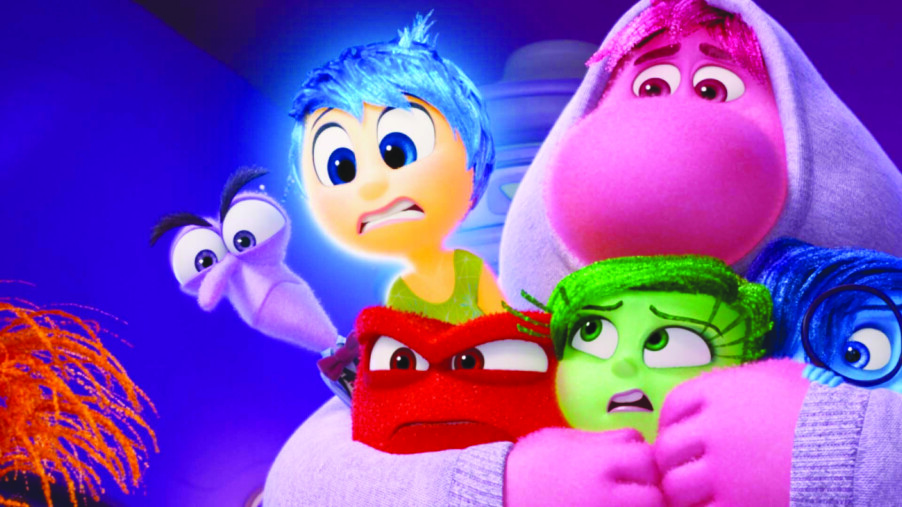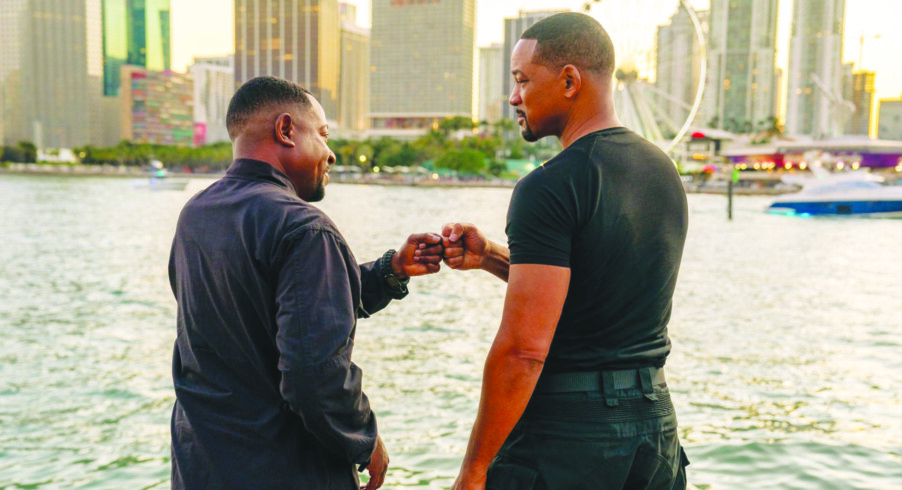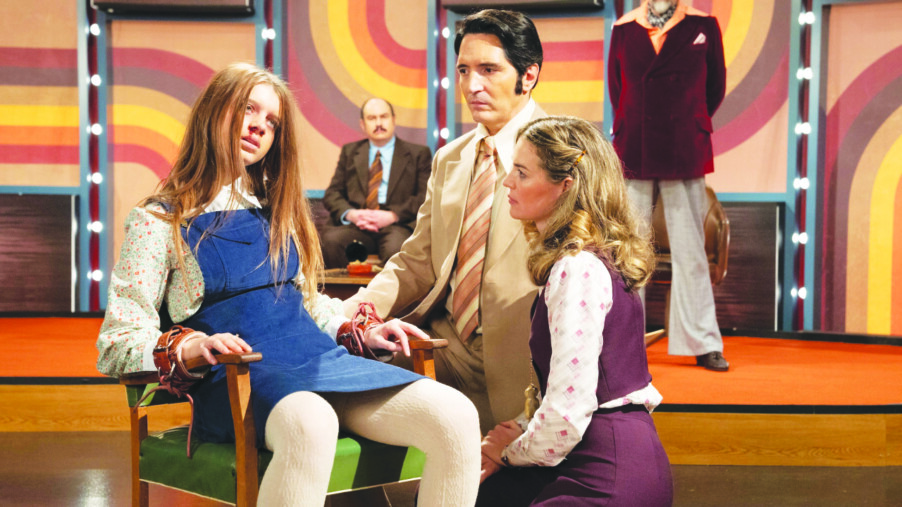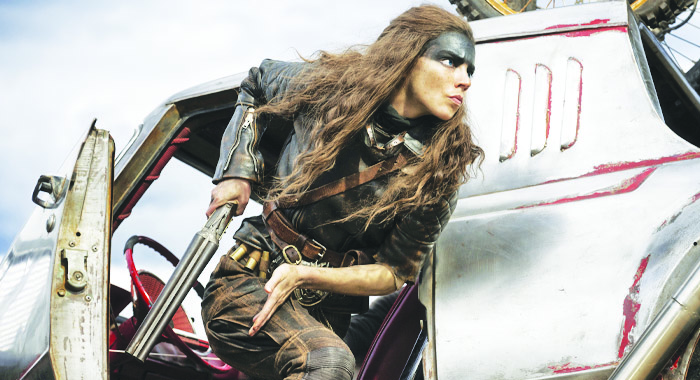A 1970s late night talk show host really monkey-paws his prayer for ratings on Late Night with the Devil, a fun shaggy horror movie.
We’re told that the movie we’re watching is a combination of the show as it was aired and behind-the-scenes footage for the presumably final episode of Night Owls with Jack Delroy, a nighttime show in the 1970s that could never quite knock Johnny Carson off his perch as the king of late night. Host Jack Delroy (David Dastmalchian) earned his best ratings on the night his wife Madeleine (Georgina Haig) came on the show shortly before she died of cancer. Since then, he’s been in personal and professional turmoil. We also get some “the 1970s, man, they were wild” footage of riots and upheaval, mixed in with some “news” footage about a satanic cult.
All of which brings us to Halloween night in 1977, which also happens to be the start of sweeps week — which, fond sigh, kids, ask your grandpappies about the stunts and special guest stars TV shows broke out for those ratings-significant periods in the TV year. For Jack’s desperate ratings grab, he’s planned a Halloween show all about the hot topic that is the occult, featuring psychic Christou (Fayssal Bazzi), magician-turned-skeptic Carmichael Haig (Ian Bliss), parapsychologist June Ross-Mitchen (Laura Gordon), her patient Lilly (Ingrid Torelli) and a singer that we’re all pretty sure is going to be bumped for time. June’s book, Conversations with the Devil, is about Lilly, the sole survivor of the satanic cult mentioned in the intro footage, who June claims is possessed by a demon.
The show starts with the kind of borderline corny comedy one associates with this particular time in TV — Jack offers a mostly “meh” comedy monologue, he does some banter with/light ribbing of Ed McMahon-ish sidekick Gus McConnell (Rhys Auteri), a band juices up the jokes with musical moments, and it all happens in front of an appropriate stripes-and-mustard-tones set.
Christou is the first guest, offering some clumsy cold reads with messages from people who have crossed over. Right before his time ends, though, he is struck by what is perhaps a “real” supernatural moment — he drops his vaguely Spanish magic-y person accent, he grabs his head in pain and his eyes roll back. The audience seems shocked, Jack isn’t quite sure what’s going on and producer Leo Fiske (Josh Quong Tart) is delighted that this moment of spookiness might attract viewers and attention.
I am here for this vibes-based horror. Rubber bats and goofy costumes in the audience mix with behind-the-scenes sweaty desperation and “it’s all an act” jadedness that help make the setting as regular and “nothing to see here” as it gets — until maybe it isn’t. What if Dick Cavett but sweatier and maybe possessed — it’s sort of a weird concept but it works and is mostly a fun-ride take. (The ending is abrupt and has a “we’ve only got the set for one more day, just go with what we have” not-quite feeling that, honestly, fits with the movie’s mood even if it doesn’t quite satisfy storywise.)
David Dastmalchian is exactly perfect in the lead role. He’s both sorta famous — he’s a real “he’s literally in everything” guy (his IMDb includes Marvel, DC, TV, Oppenheimer) — and not so well-known that he can’t sink into the sad, desperate mess that is Jack Delroy. B
Rated R for violent content, some gore, and language including a sexual reference, according to the MPA at filmratings.com. Written and directed by Cameron Cairnes and Colin Cairnes, Late Night with the Devil is an hour and 26 minutes long and distributed by IFC Films. It is available on AMC+ and for rent or purchase.
The First Omen (R)
The “all” in “it’s all for you” is a long ramp-up prequel to the action of the original The Omen in The First Omen, a movie that is a baroque operatic shriek but isn’t quite as fun as that implies.
I found myself thinking a lot about Evil during this movie, the series that just started its fourth and final season. It is airing on Paramount+ and it is a Robert and Michelle King joint (they of the The Good Wife television universe). Evil is a chocolate fudge sundae with extra cherries for a certain kind of dogma-fascinated lapsed Sunday school kid, thoroughly gleeful in its dark goofiness. It is a kick and a half and if you haven’t checked it out, run, don’t walk. This season’s endgame seems to be Antichrist-focused, not unlike this movie — is that a spoiler? If you aren’t aware that demon-children is the territory this movie is playing in, I’m not sure why you would watch it. It’s not a traditional horror in the sense of The Nun movies. It feels to me very much like Evil, very much Catholic school kids misbehaving with apocryphal church lore, but louder and without the sense of humor. (Evil has Andrea Martin in the supporting role of a demon-fighting nun, if you need another reason to check it out.)
Here, we’re following Margaret (Nell Tiger Free, best-known probably as the second Myrcella Baratheon from Game of Thrones), a young American novitiate showing up in early 1970s Rome to work at a Catholic convent/girls’ orphanage and school and take her vows and become a fully fledged nun. She’s been brought over by Cardinal Lawrence (Bill Nighy), a mentor since she was a child growing up in her very own nun-run girls’ school/orphanage institution. She was a “bad kid” back then, but Cardinal Lawrence helped put her on the right path, Cardinal Lawrence is the best — I’m sure the movie will prove this to be true!
She is sharing a room with fellow novitiate Luz (Maria Caballero), who has decided to spend her last days pre-veil trying out decolletage and disco. She gets Margaret to join her for a night on the town, and though Margaret is fuzzy the next morning, Luz assures her that nothing too untoward happened.
Margaret is rather fuzzy at her new job too, where she can’t understand why all the other nuns are so mean to Carlita (Nicole Sorace), an admittedly odd child made all the odder by her regular isolation from other kids. Margaret feels protective toward Carlita, and when Father Brennan (Ralph Ineson) shows up telling her that Carlita is part of a larger conspiracy, she might not immediately believe him — but she doesn’t completely discount him either.
This movie revs up slowly before barrelling toward a bonkers conclusion, all wheels flying off and motor on fire. Like a wild roller coaster you ride after waiting in a two-hour line, the finale helps you to forget a bit how much the beginning of this endeavor seemed to crawl. Well, the very beginning firmly plants us in the realm of “The Devil,” but then we slow-walk it through a novitiate’s quiet yet unsettling adventures in Rome to get back to that point.
That said, the bulk of the movie is not a lunacy drought. The movie is filled with devil imagery and so much gore, much of it centered around childbirth. The movie even brushes up close to Saying Something about female power, both in the church and in the wider world, which would have been a bit of clever fun in this kind of horror movie (and very Evil).
The movie does have a lot going for it and a lot of that — how the story comes together, how the movie walks the tightrope between terror and ridiculousness — is due to the skill of Free. She is very good at hitting the exact right notes with Margaret, who goes from sincere to scared to worried about her own mental state to determined.
The First Omen doesn’t exactly hit a bull’s-eye for me in either the genuinely scary or delightfully unhinged targets, but it is enough of a near miss for both that I had a decent time. Also, seriously, watch Evil. B- (for The First Omen; the TV show Evil is an A+ with a chef’s kiss).
Rated R for violent content, grisly/disturbing images, and brief graphic nudity, according to the MPA on filmratings.com, and some real House of the Dragon birthing-body horror stuff that you can not unsee, according to me. Directed by Arkasha Stevenson with a screenplay by Tim Smith & Arkasha Stevenson and Keith Thomas, The First Omen is two hours long and distributed by 20th Century Studios. The movie is now available for rent or purchase and is streaming on Hulu.
At The SOFAPLEX
The Last Stop in Yuma County (R)
Bank robbers, locals and folks passing through unfortunately intersect at a dusty diner in 1970s-ish Arizona in The Last Stop in Yuma County, a decently fun movie whose whole vibe is “tension plus heat and dirt.”
Charlotte (Jocelin Donahue) is the only one working behind the counter at the diner on the day that the air conditioning goes out and the fuel truck is late to fill up the empty pumps at the gas station across the road where owner Vernon (Faizon Love) has to tell people that they can wait in the diner for the truck or try to make it 100 miles to the next station.
A kitchen knife salesman (Jim Cummings) decides to wait it out, as do an older couple on a road trip (Gene Jones, Robin Bartlett). Charlotte and the knife salesmen are trying to act normal in the stuffy diner because that’s what fellow patrons Beau (Robert Brake) and Travis (Nicholas Logan) have told them to do. The knife salesman had absolutely no chill when he got a glimpse of Beau and Travis’ car and realized it and they fit the description of bank robbers who got away from a robbery earlier that morning. Soon Beau is holding them at gunpoint — as well as everybody else who happens through the diner, whether they know it or not — and waiting for the fuel truck and an escape route to show up. Will that happen before Charlotte’s husband, Charlie (Michael Abbott Jr.), the local sheriff, figures out that things are squirrelly at his wife’s diner?
“Waiting for the other shoe to drop” is basically what the movie is all about, especially as other people enter the picture, such as Charlie’s hapless deputy and a young couple eager to either emulate or steal from the robbers. There is maybe too much waiting and too little shoe, with a climax that is only momentarily exciting. This movie is fine if you happen by it but nothing I’d go out of my way to seek out. C+ Available for rent or purchase.
The Beekeeper (R)
Jason Statham is a beekeeper in the dumb and awesome The Beekeeper.
Adam Clay (Statham) is a beekeeper who protects the hive (a thing he says eleventy billion times here) in both the literal sense and the “government agency with dumb name” sense. Literally, he keeps bees on the property of Eloise Parker (Phylicia Rashad), a nice lady who was nice to him. In the other sense he’s recently retired from The Beekeepers, an outside the normal order of things group of government assassins. So when Eloise takes her own life after being scammed out of every penny she has, Adam and his particular set of skills killer-robot marches through every level of the organization of scammers, blowing stuff up and demolishing every henchman put in front of him. Working a parallel investigation into what happened to Eloise is her daughter, FBI agent Verona Parker (Emmy Raver-Lampman), who is also awesome and if somebody wants to do an equally dumb spinoff movie about her, I promise to buy tickets.
I didn’t actually see this movie in a theater; I saw it at home on a day I specifically was looking for something fun and stupid to watch, and this movie super fit the bill. It is exactly, 100 percent, completely what you think you will get based on the phrase “Jason Statham in The Beekeeper,” said in that “in a world” voice. It’s all punching, all ka-booming, all threats and violent comebacks to dumb taunts. It is, when you need this sort of thing, perfect. B+ Available for rent or purchase.
Featured photo: Late Night with the Devil






